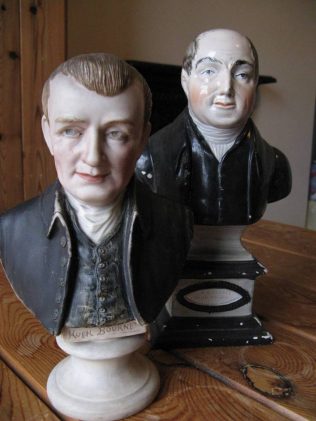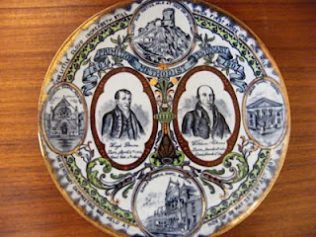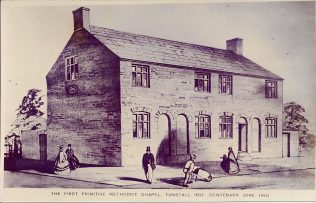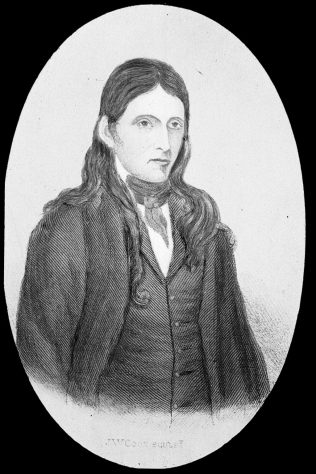What is Primitive Methodism? A short introduction





The 19th century working class movement known as Primitive Methodism, originated in the Potteries, where an open air ‘camp’ meeting was held at Mow Cop in 1807, igniting a passion for the love of God which quickly spread across the Midlands. By the end of the century there were over 200,000 members.
Industrial revolution
In the context of the growing democratisation and sense of dislocation caused by the Industrial Revolution, it appealed primarily to miners and mill hands, farm labourers, and workers in developing factory towns. In rural areas, Primitive Methodists often came into conflict with the Squire and Anglican clergy, who saw them as a threat to the established order.
A people’s movement
Hugh Bourne and William Clowes are credited as the founders, but it was a people’s movement, with a network of local societies and travelling preachers. Some were great characters, such as Eleazor Hathorn, a one legged veteran of the Napoleonic wars, and John Oxtoby, known as ‘Praying Johnny’. Women had an important role, like Sarah Kirkland, who at the age of 21 went to Nottingham, and preached to a huge crowd in a disused factory in Broad Marsh.
Self worth
Primitive Methodism gave people a sense of self-worth and a desire for self-improvement. Chapels provided education and an opportunity to develop skills in public speaking and leadership. It also provided an alternative way of life, based on moral values, which helped raise families out of poverty.
Social justice
The conviction that God’s love was for all, led to a concern for social justice, and many Primitive Methodists became involved in politics, as trade unionist leaders, Chartists, and later as Labour MPs. George Edwards, who championed the cause of farm labourers in Norfolk, is typical of the early trade union leaders who developed their passion and leadership skills through the Primitive Methodist Chapels. Started his working life at the age of six, he was illiterate until he found faith and embarked on a journey of self-education, as he recounts in From Crow Scaring to Parliament.
Persecution
Thomas Russell, known as ‘the Apostle of Berkshire’, was even imprisoned for his faith. Sent to Berkshire in 1829, he faced violent opposition, and burst a blood vessel preaching in the open air, trying to be heard above the noise. People were afraid to invite him to hold services in their homes because they faced threats of loss of work and eviction. His perseverance eventually paid off, and Berkshire became one of the strongholds of Primitive Methodism.
What’s in a name?
Also known as ‘Ranters’, for their enthusiastic preaching, ‘Primitive’ Methodists were so called because they wanted a return to an earlier, purer form of Methodism, as founded by John Wesley, based on the early church. In 1932 Primitive Methodists joined with Wesleyan and United Methodists to form the Methodist Church, which continues to promote faith and justice in contemporary society.





Comments about this page
This is a fascinating read. I first came to this site i think last year, after buying a Primitive Methodist hymnal (from England) on Ebay, interested in learning about this branch of Methodism. I have no Primitive Methodist ancestors of my own, but the person whose name is in the hymnal was PM, which gave me alot to research. I live in Pennsylvania & am United Methodist, since birth. But I just say reading about the PM movement & about the different districts, circuits & overview of the structure of the church has me enlightened & excited to learn more. I’m aware of a PM church in Pennsylvania, but I live in an area where that kind of church is not present. So am hoping to start a PM society or church mirroring the exact same beliefs of the PM movement or John Wesley. This is exciting stuff. I wake up every morning ready & wanting to learn more, read about more chapels. Thank God for Hugh Bourne & William Clowes. Great men of faith & fervor. God bless!!
Geoff,
Thank you so much for your quick response and for the information! I apologize for not responding sooner, but I got sidetracked and am just returning to this site. I will follow up on your suggestions and let you know how I make out!
Be well, Eileen
Eileen,
Thank-you for your comment. There certainly were Primitive Methodists in Abergavenny at the time James Trickery lived there. If on this site you look under the Chapels tag on the left of the page and then select Monmouthshire, you will find a page about Abergavenny PM Chapel.
If records exist from that time they should be lodged in the Gwent Records Office, probably under the heading Abergavenny Primitive Methodist Circuit. You should be able to interrogate the catalogue of the Records Office on-line to see if there is any potential information. The type of records that may be of interest would be preaching plans, minutes of Trustees Meetings, minutes of Circuit Quarterly meetings.
Very interesting! I first learned of this form of the Methodist religion while researching my family history. My grt grt grandfather was one of the original trustees of the American Primitive Methodist Church in Mahanoy City, Pennsylvania, USA in 1864. James Trickey immigrated in 1860 from Abergavveny, Monmouthshire, Wales. I wonder if there was a Primitive Methodist Church in that area at the time? I would love to know if he was involved with the church in Wales or in England where he was born (Weston, Somerset) If anyone has thoughts on where I might search, I would be very appreciative. Thank you for this introduction to the religion!
Does anyone have information about Elijah Jennings, born 1842 who was Vice President of Conference in 1890? I believe he was the great great grandfather of my sons, but would welcome any more details to verify this. Jean Jennings
I am researching my family history, and have located a christening record for William Jenkin. The date of the Christening was 18 December 1848 , and the location was the Redruth Primitive Methodist chapel. I was hoping to research the chapel further and wondered if there would be a contact name in Redruth now.
I am also interested in researching further into the Primitive Methodists in Australia.
I was very interested to see the write up on this website on Thomas G Faulkner who was my Great Great Grandfather. As I am doing a family tree at the moment it also gave me some more information.
I believe my grandmother was a member of the Band of Hope in Normanton WR Yorkshire. Also my great grandfather was suppose to be a lay preacher in Mansfield. Is there any way of checking these two family ‘legends’?
David,
If there are records of the Normanton Band of Hope they would be in the County Archive – try searching the West Riding Archives online to see if Normanton Band of Hope throws up any records.
Regarding your great grandfather you could look for Primitive Methodist Preaching Plans for the Mansfield Circuit in the Nottinghamshire archives to see if his name is listed in the list of preachers.
I was intrigued to read that Primitive Methodism evolved in the Potteries, not too far from where I live now in Cheshire. My family originated in Dunstable, Bedfordshire, and specifically in the farming villages between Dunstable and Leighton Buzzard; a second cousin has traced family history back to the time of Shakespeare. On moving to more industrial-type employment Luton and then Dunstable, my great-great-grandfather and, particularly, my great-grandfather became pillars of the Dunstable Primitive Methodist Church. On joining with the Wesleyans in 1932 the family seemed to have lost touch with Methodism, my great-grandfather having moved to west London and dying there shortly afterwards. Having recently “discovered” Englesea Brook I will certainly be visiting there and trying to find out more about the Primitive past of my ancestors.
I like the comment about self-worth. My great grand-parents founded a primitive chapel in Winchmore Hill, Buckinghamshire. My grandmother married a young man who was born in Barthomley and had twelve children. Two of her sons married Catholic sisters from Liverpool, a daughter embraced the Catholic faith to marry and others left religious belief behind. She always attended the Methodist church in Stockport but never lost contact with any of her children and they all lived happy and fulfilled lives. I think her tolerance and integrity may have come from the enlightened way she was brought up in the 1860’s and 70’s.
I was born in 1932( the year of the amalgamation of the methodist churches) My mother was brought up a Wesleyan and my father a Primative Methodist, they worshipped in a United Methodist Church when they got married. Is this significant?
At the Methodist Church I attended as a youngster, the congregation still attended the ‘prims’ on a Sunday (and still do today). Why? Well the village of Dove Holes in Derbyshire is adjacent to the town of Chapel-en-le-Frith. If people said they were going to Chapel on Sunday, did they mean the town or the church. The distinction of Prims left nobody in doubt as to where they were going.
Thank you for this fascinating potted history Jill. I am keen to trace the threads of family beliefs and values as they seep down through the generations. Understanding them in the social context of the day is most illuminating. As well as adding colour to family history, it helps me to understand how I came to be me!
Add a comment about this page